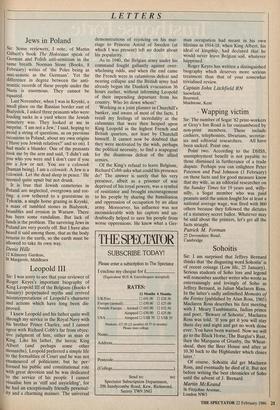Leopold III
Sir: I was sorry to see that your reviewer of Roger Keyes's important biography of King Leopold III of the Belgians (Books 4 January) perpetuated myths and revived misinterpretations of Leopold's character and actions which have long been dis- proved.
I knew Leopold and his father quite well through my service in the Royal Navy with his brother Prince Charles, and I cannot agree with Richard Cobb's far from objec- tive judgment of him, either as man or King. Like his father, the heroic King Albert (and perhaps some other Monarchs), Leopold preferred a simple life to the formalities of Court and he was not enamoured of politicians; but he per-1 formed his public and constitutional role with great devotion and he was dedicated to the service of his people. I cannot visualise him as 'stiff and unyielding', for he had an exceptionally friendly personal- ity and a charming manner. The universal demonstrations of rejoicing on his mar- riage to Princess Astrid of Sweden (at which I was present) left no doubt about his popularity.
As to 1940, the Belgian army under his command fought gallantly against over- whelming odds, and when the end came the French were in calamitous defeat and nearing collapse and the British army had already begun the Dunkirk evacuation 36 hours earlier, without informing Leopold of their impending departure from his country. Who let down whom?
Working as a joint planner in Churchill's bunker, and aware of most of the facts, I recall my feelings of incredulity at the calumnies that were then heaped upon King Leopold in the highest French and British quarters, not least by Churchill himself. It cannot now be doubted that they were motivated by the wish, perhaps the political necessity, to find a scapegoat for the disastrous defeat of the allied armies.
Of the King's refusal to leave Belgium, Richard Cobb asks what could his presence do? The answer is surely that his very presence, albeit as a prisoner of war deprived of his royal powers, was a symbol of resistance and brought encouragement to his people by sharing the humiliation and oppression of occupation by an alien army. Moreoever, his influence was not inconsiderable with his captors and un- doubtedly helped to save his people from worse oppressions. He knew what a Ger- man occupation had meant in his own lifetime in 1914-18, when King Albert, his ideal of kingship, had declared that he would never leave Belgian soil, whatever happened.
Roger Keyes has written a distinguished biography which deserves more serious treatment than that of your somewhat trivialised review.
Captain John Litchfield RN
Snowfield, Bearsted, Maidstone, Kent














































 Previous page
Previous page